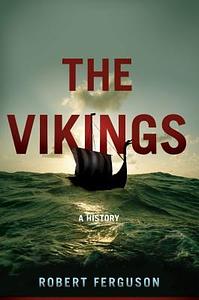Take a photo of a barcode or cover
Very in-depth, very knowledgeable, but also very dry. The book is a great read if you wanted updated on Norse history/Viking research, bringing most of it up to date. However, Ferguson has the historian's dry telling that makes what is a great story into something that is slightly less. If you want information and the resources that back it, this is a great book. However, be aware of it's shortcomings.
A great source packed general history of the Viking Age.
There have been many books written on the Vikings, and everyone has their own stereotypical – and in most cases, inaccurate – idea of who the Vikings were and what they were like; media has done much to reaffirm these clichés. Thankfully, there is The Vikings: A History by a “leading authority in the field of Scandinavian studies,” Robert Ferguson. Ferguson puts all the misconceived and incorrect notions of Vikings to rest, launching into a comprehensive history of these northern peoples and what affect they had on Europe from the eighth centuries on through the first millennium. Ferguson pulls from many sources, and presents not just the viewpoint of the Vikings and their achievements, but also short histories on the northern British Isles, Charlemagne, and the various kingdoms of the European continent, showing how greatly affected they were by the Viking attacks and takeovers. The Vikings: A History will clear away the image of a horn-helmeted brute and replace it with a developed, complex culture that was intelligent and creative, and had reasons for the attacks against the various peoples of Europe.
For more book reviews and exclusive author interviews, go to BookBanter.
For more book reviews and exclusive author interviews, go to BookBanter.
I bought what I thought was the full book but it turned out to be just the chapter on England and Ireland, which was a bit annoying.
It's a decent explanation though of the Viking invasions.
It's a decent explanation though of the Viking invasions.
challenging
informative
slow-paced
Brilliant book, loved it! It's well researched, full of information, covers absolutely everything one might want to know about the so called Viking Age, with the author staying objective throughout. Admittedly, it's so dense that it requires a lot of focus when reading it. There's a great deal of kings and battles and places to keep track of, so it might be hard to follow. Not something you'll just casually read on the bus. As much as I loved it, I can understand why someone would think it to be dry and boring. It's not really a book for the casual reader with a mild interest in the subject, it's a proper scholarly work with thoroughness and objectivity being it's main agenda, rather than entertainment. But if you're willing to put up with the enormous amount of detail, or you're even excited about it, it's the right book for you!
I wasn't too crazy about this one. While there was a lot of information, it was not my focus so maybe that was why I had a disconnect. Otherwise, I'm glad I read it.
Not the history that I was looking for, pretty boring.
I bought what I thought was the full book but it turned out to be just the chapter on England and Ireland, which was a bit annoying.
It's a decent explanation though of the Viking invasions.
It's a decent explanation though of the Viking invasions.
There have been many books written on the Vikings, and everyone has their own stereotypical – and in most cases, inaccurate – idea of who the Vikings were and what they were like; media has done much to reaffirm these clichés. Thankfully, there is The Vikings: A History by a “leading authority in the field of Scandinavian studies,” Robert Ferguson. Ferguson puts all the misconceived and incorrect notions of Vikings to rest, launching into a comprehensive history of these northern peoples and what affect they had on Europe from the eighth centuries on through the first millennium. Ferguson pulls from many sources, and presents not just the viewpoint of the Vikings and their achievements, but also short histories on the northern British Isles, Charlemagne, and the various kingdoms of the European continent, showing how greatly affected they were by the Viking attacks and takeovers. The Vikings: A History will clear away the image of a horn-helmeted brute and replace it with a developed, complex culture that was intelligent and creative, and had reasons for the attacks against the various peoples of Europe.
For more book reviews and exclusive author interviews, go to BookBanter.
For more book reviews and exclusive author interviews, go to BookBanter.





